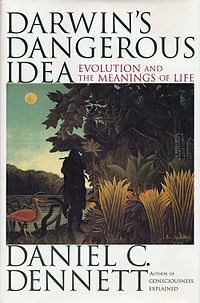Related Research Articles
In analytic philosophy, anti-realism is a position which encompasses many varieties such as metaphysical, mathematical, semantic, scientific, moral and epistemic. The term was first articulated by British philosopher Michael Dummett in an argument against a form of realism Dummett saw as 'colorless reductionism'.

Darwin's Dangerous Idea: Evolution and the Meanings of Life is a 1995 book by the philosopher Daniel Dennett, in which the author looks at some of the repercussions of Darwinian theory. The crux of the argument is that, whether or not Darwin's theories are overturned, there is no going back from the dangerous idea that design might not need a designer. Dennett makes this case on the basis that natural selection is a blind process, which is nevertheless sufficiently powerful to explain the evolution of life. Darwin's discovery was that the generation of life worked algorithmically, that processes behind it work in such a way that given these processes the results that they tend toward must be so.
Relativism is a family of philosophical views which deny claims to objectivity within a particular domain and assert that facts in that domain are relative to the perspective of an observer or the context in which they are assessed. There are many different forms of relativism, with a great deal of variation in scope and differing degrees of controversy among them. Moral relativism encompasses the differences in moral judgments among people and cultures. Epistemic relativism holds that there are no absolute facts regarding norms of belief, justification, or rationality, and that there are only relative ones. Alethic relativism is the doctrine that there are no absolute truths, i.e., that truth is always relative to some particular frame of reference, such as a language or a culture. Some forms of relativism also bear a resemblance to philosophical skepticism. Descriptive relativism seeks to describe the differences among cultures and people without evaluation, while normative relativism evaluates the morality or truthfulness of views within a given framework.

Pragmatism is a philosophical tradition that considers words and thought as tools and instruments for prediction, problem solving, and action, and rejects the idea that the function of thought is to describe, represent, or mirror reality. Pragmatists contend that most philosophical topics—such as the nature of knowledge, language, concepts, meaning, belief, and science—are all best viewed in terms of their practical uses and successes.

Richard McKay Rorty was an American philosopher. Educated at the University of Chicago and Yale University, he had strong interests and training in both the history of philosophy and in contemporary analytic philosophy. Rorty had a long and diverse academic career, including positions as Stuart Professor of Philosophy at Princeton University, Kenan Professor of Humanities at the University of Virginia, and Professor of Comparative literature at Stanford University. Among his most influential books are Philosophy and the Mirror of Nature (1979), Consequences of Pragmatism (1982), and Contingency, Irony, and Solidarity (1989).
In philosophy of science and in epistemology, instrumentalism is a methodological view that ideas are useful instruments, and that the worth of an idea is based on how effective it is in explaining and predicting phenomena. According to instrumentalists, a successful scientific theory reveals nothing known either true or false about nature's unobservable objects, properties or processes. Scientific theory is merely a tool whereby humans predict observations in a particular domain of nature by formulating laws, which state or summarize regularities, while theories themselves do not reveal supposedly hidden aspects of nature that somehow explain these laws. Instrumentalism is a perspective originally introduced by Pierre Duhem in 1906.

Wilfrid Stalker Sellars was an American philosopher and prominent developer of critical realism, who "revolutionized both the content and the method of philosophy in the United States".
Skyhook, sky hook or skyhooks may refer to:

A skyhook is a proposed momentum exchange tether that aims to reduce the cost of placing payloads into low Earth orbit. A heavy orbiting station is connected to a cable which extends down towards the upper atmosphere. Payloads, which are much lighter than the station, are hooked to the end of the cable as it passes, and are then flung into orbit by rotation of the cable around the center of mass. The station can then be reboosted to its original altitude by electromagnetic propulsion, rocket propulsion, or by deorbiting another object with the same kinetic energy as transferred to the payload.

Robert Boyce Brandom is an American philosopher who teaches at the University of Pittsburgh. He works primarily in philosophy of language, philosophy of mind and philosophical logic, and his academic output manifests both systematic and historical interests in these topics. His work has presented "arguably the first fully systematic and technically rigorous attempt to explain the meaning of linguistic items in terms of their socially norm-governed use, thereby also giving a non-representationalist account of the intentionality of thought and the rationality of action as well."

The linguistic turn was a major development in Western philosophy during the early 20th century, the most important characteristic of which is the focusing of philosophy and the other humanities primarily on the relations between language, language users, and the world.
Neopragmatism, sometimes called post-Deweyan pragmatism, linguistic pragmatism, or analytic pragmatism, is the philosophical tradition that infers that the meaning of words is a result of how they are used, rather than the objects they represent.

In basketball, a hook shot is a play in which the offensive player, usually turned perpendicular to the basket, gently throws the ball with a sweeping motion of the arm farther from the basket in an upward arc with a follow-through which ends over his head. Unlike the jump shot, it is shot with only one hand; the other arm is often used to create space between the shooter and the defensive player. The shot is quite difficult to block, but few players have mastered the shot more than a few feet from the basket.
Postanalytic philosophy describes a detachment from the mainstream philosophical movement of analytic philosophy, which is the predominant school of thought in English-speaking countries. Postanalytic philosophy derives mainly from contemporary American thought, especially from the works of philosophers Richard Rorty, Donald Davidson, Hilary Putnam, W. V. O. Quine, and Stanley Cavell. The term is closely associated with the much broader movement of contemporary American pragmatism, which, loosely defined, advocates a detachment from the definition of 'objective truth' given by modern philosophers such as Descartes. Postanalytic philosophers emphasize the contingency of human thought, convention, utility, and social progress.
In philosophy, four-dimensionalism is the ontological position that an object's persistence through time is like its extension through space. Thus, an object that exists in time has temporal parts in the various subregions of the total region of time it occupies, just like an object that exists in a region of space has at least one part in every subregion of that space.
Richard Shusterman is an American pragmatist philosopher. Known for his contributions to philosophical aesthetics and the emerging field of somaesthetics, currently he is the Dorothy F. Schmidt Eminent Scholar in the Humanities and Professor of Philosophy at Florida Atlantic University.

Contingency, Irony, and Solidarity is a 1989 book by the American philosopher Richard Rorty, based on two sets of lectures he gave at University College, London, and at Trinity College, Cambridge. In contrast to his earlier work, Philosophy and the Mirror of Nature (1979), Rorty mostly abandons attempts to explain his theories in analytical terms and instead creates an alternate conceptual schema to that of the "Platonists" he rejects. In this schema "truth" is considered unintelligible and meaningless.
In Being and Time, the philosopher Martin Heidegger made the distinction between ontical and ontological, or between beings and "being" as such. He labeled this the "Ontological Difference." It is from this distinction that he developed the concept of "Fundamental Ontology."

The SkyHook JHL-40 was a proposed hybrid airship/helicopter. On July 9, 2008, Boeing announced that it had teamed up with SkyHook International, a Canadian company, to develop this aircraft. No further press releases appear after 2009 and Skyhook International has abandoned its domain name registration since 2010 as shown by the Internet Archive.

Space tethers are long cables which can be used for propulsion, momentum exchange, stabilization and attitude control, or maintaining the relative positions of the components of a large dispersed satellite/spacecraft sensor system. Depending on the mission objectives and altitude, spaceflight using this form of spacecraft propulsion is theorized to be significantly less expensive than spaceflight using rocket engines.
References
- ↑ Dlouhy, Michael (2009-02-09). "A Boy Scout Comes Clean" . Retrieved 2010-07-02.
- ↑ "Sky Hook". The Concise New Partridge Dictionary of Slang and Unconventional English. Retrieved 2010-07-02.
- ↑ "Stanford Encyclopedia of Philosophy: Richard Rorty".